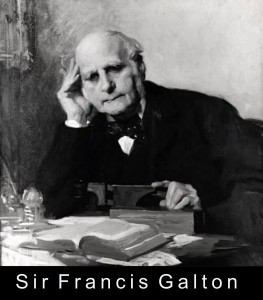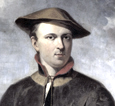 In The Origin of Species, Charles Darwin wove the eugenic philosophy of Plato into the theory of natural selection. By arguing that “extinction and natural selection go hand in hand,” Darwin legitimized the eugenics movements of the 20th century.
In The Origin of Species, Charles Darwin wove the eugenic philosophy of Plato into the theory of natural selection. By arguing that “extinction and natural selection go hand in hand,” Darwin legitimized the eugenics movements of the 20th century.
Eugenics originated in ancient cultures. Rome, Athens, and Sparta practiced eugenics to improve the strength and survival of their societies. Encouraged by his brother, Erasmus, Darwin read An Essay on the Principle of Population by Thomas Robert Malthus, an English political economist, in 1838.
Darwin
Reading the book was a life-changing experience. Darwin recalls the effect of reading the book in his Autobiography –
“In October 1838 … I happened to read for amusement Malthus On Population, and being well prepared to appreciate the struggle for existence which everywhere goes on from long-continued observation of the habits of animals and plants, it at once struck me that under these circumstances, favorable variations would tend to be preserved, and unfavorable ones to be destroyed. The result of this would be the formation of new species. Here, then, I had, at last, got a theory by which to work.”
By destroying the “unfavorable,” a new species would form. For the human species, therefore, Darwin justifies extinction by eugenics. As Darwin explains –
“Natural Selection, entailing Divergence of Character and the Extinction of less improved forms… from the war of nature, from famine and death, the most exalted object which we are capable of conceiving, namely, the production of the higher animals, directly follows.”
Galton
Sir Francis Galton, Darwin’s cousin, after reading The Origin of Species, extended Darwin’s concept of natural selection. After sketching out his theory in the 1865 article “Hereditary Talent and Character,” Galton further elaborated in his 1869 book Hereditary Genius. Galton reasoned, like Darwin, that artificial selection in animals would produce similar results in humans. In the introduction to Hereditary Genius, Galton wrote –
“to obtain by careful selection a permanent breed of dogs or horses gifted with peculiar powers of running, or of doing anything else, so it would be quite practicable to produce a highly-gifted race of men by judicious marriages during several consecutive generations.”
In 1883, Galton coined the term ‘eugenics’ [Greek: εύ (eu) meaning ‘well’ and γένος (genos) meaning ‘kind’ or ‘offspring’] for the study of ways of improving the physical and mental characteristics of the human race.
Galton’s eugenics movement operationalized Darwin’s view to preserve favored races. The complete title of The Origin of Species is On the Origin of Species by Means of Natural Selection or the Preservation of Favoured Races in the Struggle for Life.
Darwin Endorses Galton
Darwin endorsed Galton, referring to Galton no less than eleven times in The Descent of Man (1871). The practice of extinction by eugenics quickly became an institutionalized worldwide phenomenon.
Galton became a legend, receiving the Huxley Medal from the Anthropological Institute in 1901, the Darwin Medal from the Royal Society in 1902, the Darwin–Wallace Medal from the Linnaean Society in 1908, and honorary degrees from Cambridge and Oxford Universities. Galton was knighted in 1909.
Adolf Hitler recognized Sparta as the first “Völkisch State.” Three International Eugenics Congresses were held in 1912, 1921, and 1932, with eugenics activists attending from Britain, the USA, Germany, France, Australia, Canada, India, Japan, Mauritius, Kenya, and South Africa.
By 1913, one-third of the U.S. states had laws allowing for compulsory sterilization. In Sweden, about sixty thousand were similarly treated between 1935 and 1976, as did Norway and Canada.
Early during the Nazi regime in Germany, Hitler ordered the compulsory sterilization of all German citizens with ‘undesirable’ handicaps, not just those held in custody or in institutions. This was to prevent the ‘contamination’ of Hitler’s ‘superior German race’ through intermarriage.
Later, during the regime from 1938 to 1945, this surgical treatment of such ‘useless eaters’ was superseded by a more comprehensive solution—genocide. Hitler ordered the extermination of over eleven million people considered sub-human or unworthy of life.
As authenticated and documented by the Nuremberg Trials records, the sub-humans included Jews, evangelical Christians, blacks, gypsies, and the physically and mentally handicapped. Eugenics is rooted in Darwinism.
Genesis
While the laws of nature are compatible with Genesis, eugenics is anathematic to the dignity of life described by Moses in the Genesis account.
 Carolus Linnaeus (pictured left), a Swedish botanist, physician, and zoologist, formalized the modern system of naming organisms called binomial nomenclature. In the words of Linnaeus during the Scientific Revolution –
Carolus Linnaeus (pictured left), a Swedish botanist, physician, and zoologist, formalized the modern system of naming organisms called binomial nomenclature. In the words of Linnaeus during the Scientific Revolution –
“Man is the animal which the Creator has seen fit to honor with such a magnificent mind and has condescended to adopt as his favorite and for which he has prepared a nobler life; indeed, sent out for its salvation his only Son.”
Charles Darwin’s biography underscores why his theory of evolution was speculative and not scientifically valid.
Eugenics is a Biographical Sketch of Charles Darwin article.
Darwin Then and Now is an educational resource on the intersection of evolution and science, highlighting the ongoing challenges to the theory of evolution.
Move On
Explore how to understand twenty-first-century concepts of evolution further using the following links –
-
- The Understanding Evolution category showcases how varying historical study approaches to evolution have led to varying conclusions. Subcategories include –
- Studying Evolution explains how key evolution terms and concepts have changed since the 1958 publication of The Origin of Species.
- What is Science explains Charles Darwin’s approach to science and how modern science approaches can be applied for different investigative purposes.
- Evolution and Science feature study articles on how scientific evidence influences the current understanding of evolution.
- Theory and Consensus feature articles on the historical timelines of the theory and Natural Selection.
- The Biography of Charles Darwin category showcases relevant aspects of his life.
- The Glossary defines terms used in studying the theory of biological evolution.
- The Understanding Evolution category showcases how varying historical study approaches to evolution have led to varying conclusions. Subcategories include –
.


